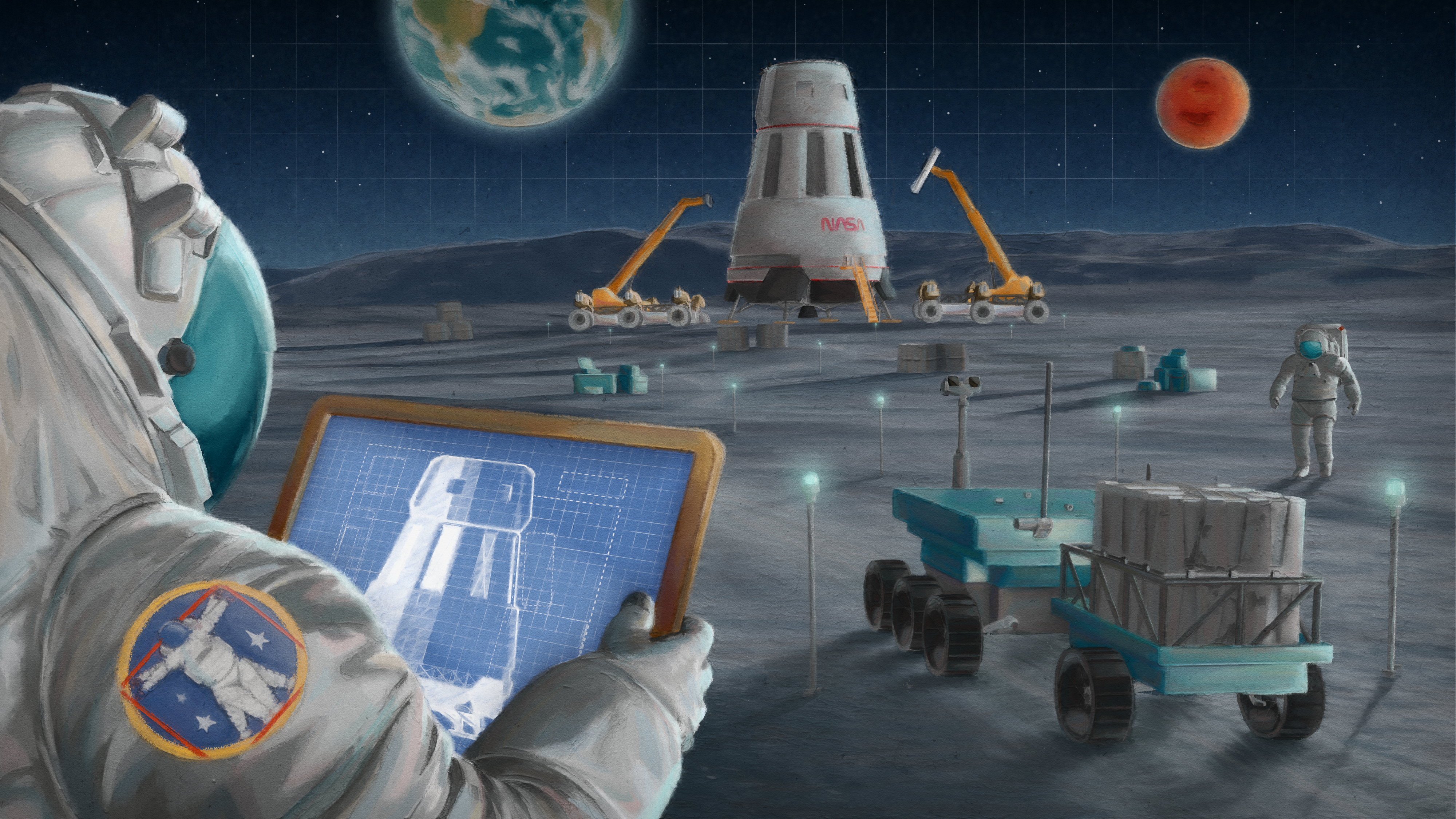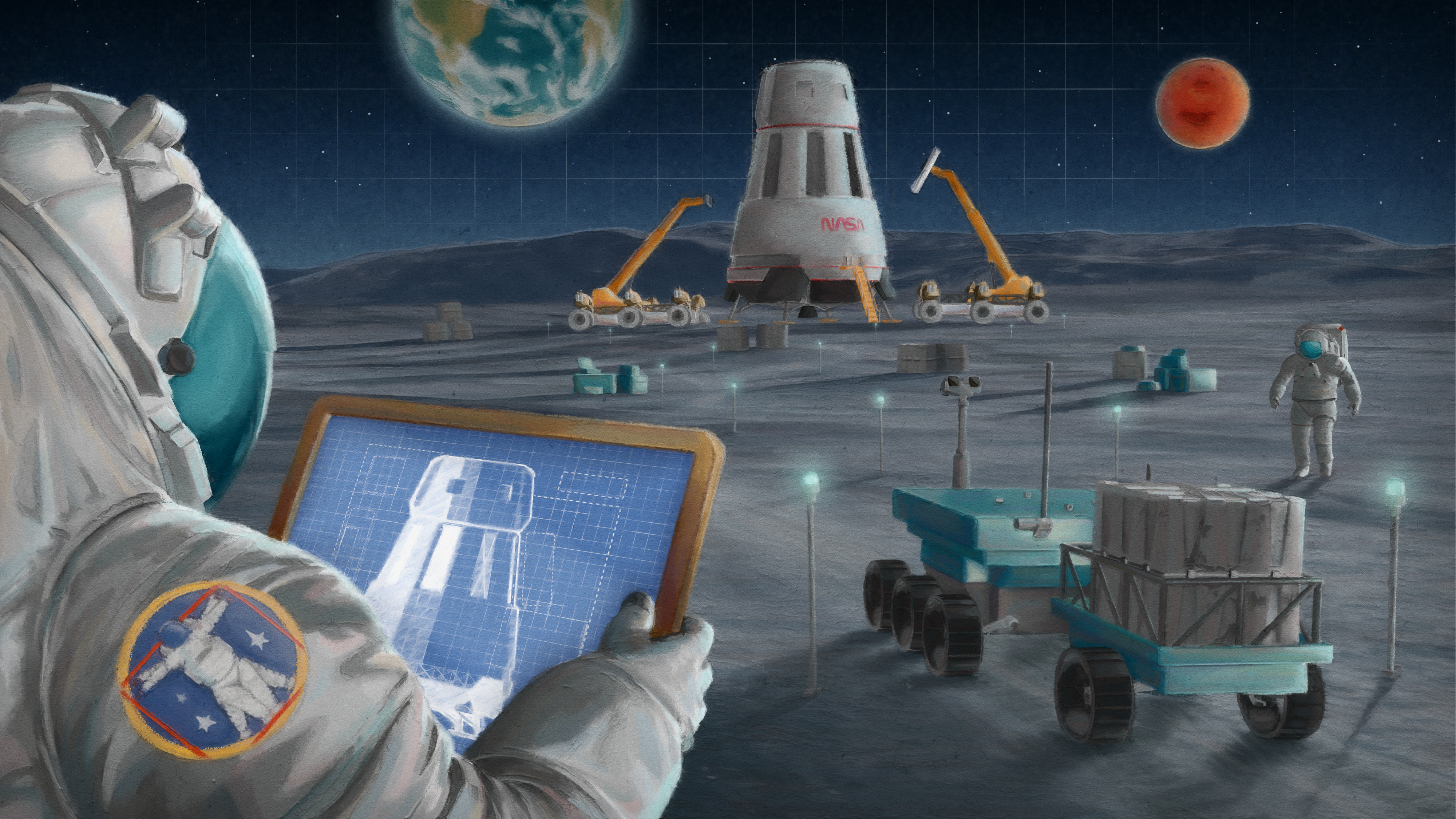 Artists’ rendering of an imagined lunar architecture. Not intended to represent any elements under consideration by NASA. NASA Solicitation Number: NNH16ZCQ001K-Appendix-R August 16, 2024 – Draft Solicitation Released
Artists’ rendering of an imagined lunar architecture. Not intended to represent any elements under consideration by NASA. NASA Solicitation Number: NNH16ZCQ001K-Appendix-R August 16, 2024 – Draft Solicitation Released
Solicitation Overview The National Aeronautics and Space Administration (NASA) intends to release a solicitation under the Next Space Technologies for Exploration Partnerships-2 (Next STEP-2) Broad Agency Announcement (BAA) to seek industry-led concept definition and maturation studies that address lunar surface logistics and uncrewed surface mobility capabilities.
NASA’s Moon to Mars Architecture defines the elements needed for long-term, human-led scientific discovery in deep space. NASA’s architecture approach distills agency-developed objectives into operational capabilities and elements that support science and exploration goals. Working with experts across the agency, industry, academia, and the international community, NASA continuously evolves that blueprint for crewed exploration, setting humanity on a path to the Moon, Mars, and beyond.
NASA has identified two gaps in its lunar architecture: an integrated surface logistics architecture and uncrewed surface mobility systems for lunar surface assets. The objective of these studies is to seek proposals from industry for the conduct of studies specifically focused on the envisioned logistics and mobility capabilities as stated in NASA’s 2024 Architecture Concept Review White Papers (Lunar Surface Cargo, Lunar Mobility Drivers and Needs) and 2023 Architecture Concept Review White Paper (Lunar Logistics Drivers and Needs).
The Exploration Systems Development Mission Directorate (ESDMD) Strategy and Architecture Office (SAO) Lunar Logistics and Mobility Studies BAA (NextSTEP-2 Appendix R) is structured to meet the following goals:
Identify innovative strategies and concepts for logistics and mobility solutions. This could include a variety of topics, including but not limited to: synergies between logistics- and mobility-specific capabilities. identification of logistics- and mobility-specific needs that may be beyond current and/or planned commercial capabilities. innovative ideas for partnership business models, including intellectual property, asset ownership, and timing of asset delivery, and/or services to the government. the use of advanced robotic and/or autonomous capabilities. Evaluate and understand driving technology maturity, cost, and schedule drivers for meeting reference technical requirements, and/or drivers for validating a concept of operations. Obtain data that supports NASA’s ability to define, derive, and validate logistics and mobility requirements. Said data could inform a baseline mission concept that identifies options for and approaches to meeting logistics- and mobility-specific capabilities. This data could also contribute to the verification/validation of logistics and mobility approaches that could support NASA’s lunar architecture. To support lunar surface operations, NASA is seeking state-of-the-art industry studies that provide an approach for technology investigation/maturation and concept development for the following:
Logistics carriers – Logistics carriers of various sizes, volumes, and configurations and the environmental control of the cargo compartment. Logistics Handling and Offloading – Handling and offloading unpressurized cargo, carriers, fluids, and gases. Logistics Transfer – The transfer of cargo from the lunar surface to a pressurized volume, Staging, Storage and Tracking – Managing surface logistics inventory prior to, during, and after delivery to the final point of use. Trash Management – Trash management that contributes to mission sustainability and maximizes crew efficiency, Surface Cargo Transportation and Mobility Systems – The movement of cargo containers on the lunar surface after delivery by a lander. Integrated Strategy – An approach for an integrated assessment of the lunar surface logistics strategy and the transportation of the logistics to the pressurized habitation elements. This can also include the incorporation of the launch vehicle and cargo lander as part of the transportation. The resulting studies will ensure advancement of NASA’s development of lunar surface logistics and mobility technologies, capabilities, and concepts.


